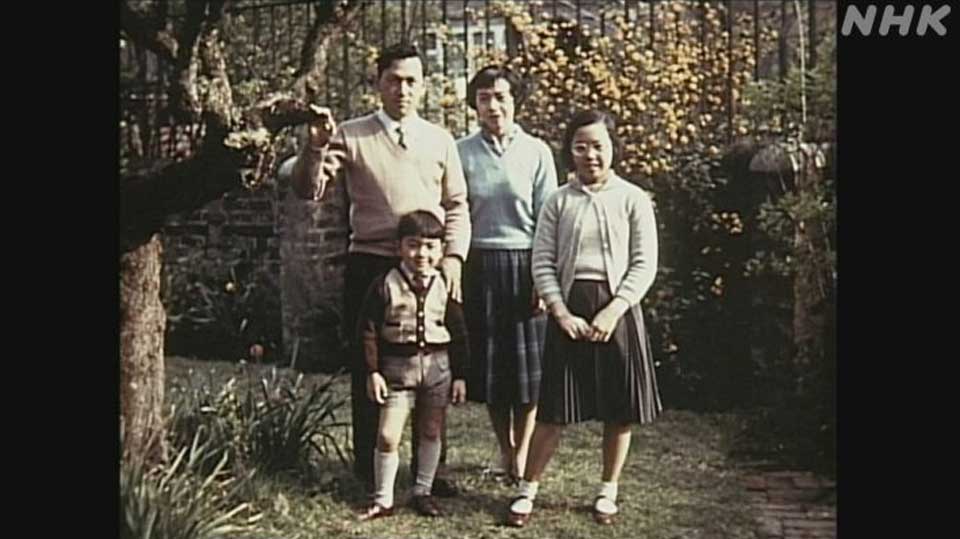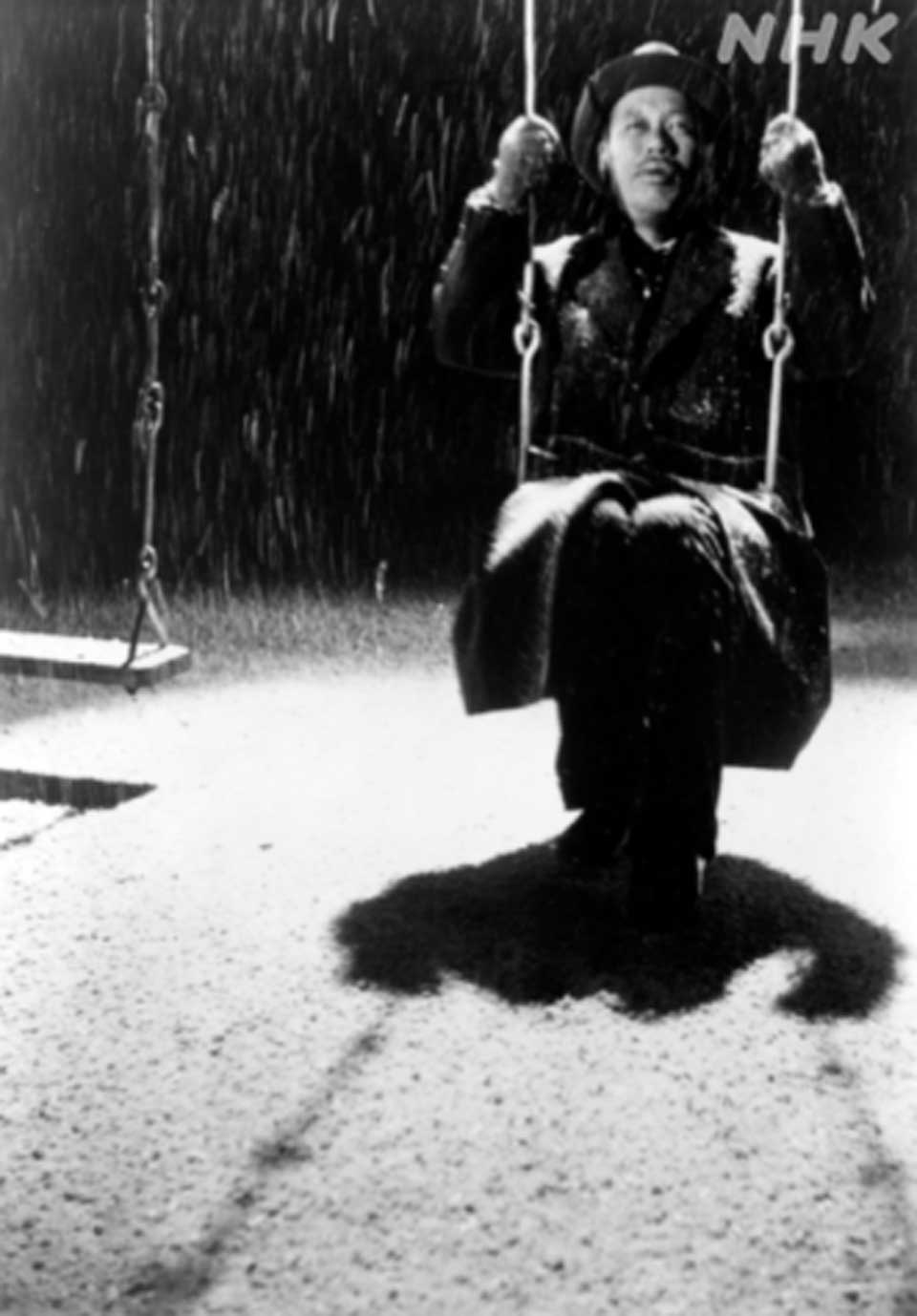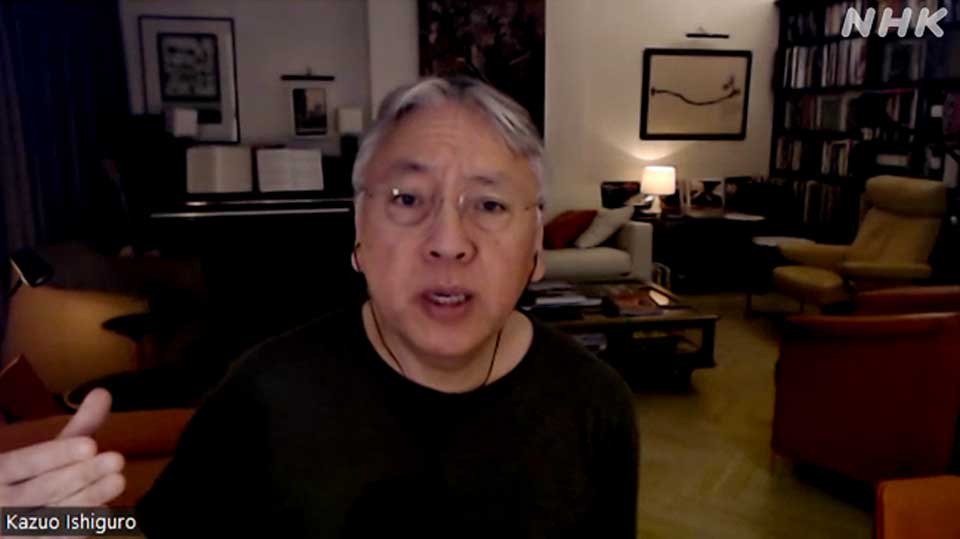"My day job is writing novels, but I'm a movie fan," Ishiguro says. "I feel slightly like a tourist in the world of film, but feel very welcomed by this gesture."
Why did he choose Ikiru for his latest filmmaking project? And what are the differences between writing for the screen and the page? Ishiguro discussed these questions and more in a wide-ranging interview with NHK.
His comments have been edited for brevity and clarity.
Childhood shaped by film
Ishiguro was born in Nagasaki Prefecture in 1954 to Japanese parents. His father was an oceanographer and in 1960, after participating in a survey of oil fields in the North Sea, he decided to move his family to the United Kingdom.

As a child, Ishiguro watched Japanese films to maintain a connection to his roots. He says he was around 11 years old when he saw Ikiru for the first time.
"There was just one slot on the educational channel on the BBC, quite late at night, when they showed international cinema," he says. "That's where I first came across Ikiru, and indeed Seven Samurai and Tokyo Story. They were very special for me because they were Japanese and a link to my parents' world."
Impact of Ikiru
Kurosawa's film tells the story of Watanabe, a civil servant who develops stomach cancer. Faced with the prospect of an imminent death, he is struck by the emptiness of the life he has lived so far: sitting at a desk, surrounded by paperwork, day in, day out. He contemplates how he can spend the rest of his time and decides to devote it to the residents he was supposed to serve. He is invigorated with purpose and works tirelessly to have a playground built in the neighborhood.

4KUltra HD Blu-ray ©1952TOHO CO.,LTD.
Ishiguro says the sudden nature of Watanabe's transformation shaped his own writing style.
"Ikiru had such a profound influence on me when I was growing up," he says. "The vision of people trapped in small lives who are trying desperately to make those lives meaningful is something I got from the movie and took with me into my novels right from the beginning."
Adapting a classic
Ishiguro set his adaptation in London, shortly after World War II. Watanabe is now Williams, but remains a civil servant. He is played by Bill Nighy.

©Number 9 Films Living Limited
While writing the script, Ishiguro considered how to shape Kurosawa's ideas in a way that would resonate with modern viewers. He decided that the introduction of a new character would help. Enter Peter, a young civil servant who witnesses Williams' transformation firsthand. By adding the figure of Peter, Ishiguro is foreshadowing the arrival of a new era in which a younger generation will draw on the more positive aspects of the past as they move forward.
"Kurosawa's film has quite a dark and pessimistic atmosphere. I thought we could make a film with a more optimistic atmosphere because we know what happened in Japan and what happened in Britain after the war. And in both cases, it was a big success story. That generation built wonderful new societies, so I wanted to introduce a younger generation into the story, a generation that would actually benefit from the legacy left by somebody like Williams or Watanabe in the original film."

©Number 9 Films Living Limited
But Ishiguro did not want to do anything that would affect Ikiru's overall message. In the original, Watanabe's late-life determination moves his colleagues. After his funeral, they vow to live the rest of their lives in ways that honor his memory. But back at the office, they quickly revert to their old ways, living in much the same way Watanabe had before his illness. Ishiguro says this reveals something important about Kurosawa's worldview.
"He basically says it is possible to be heroic in life, but don't expect any credit or applause," the author says. "He warns us that if you do things in order to get praise from the world, you will be disappointed."
Ishiguro adds, "You have to learn to do things for yourself, for your own satisfaction, and for your own fulfillment. In other words, success and failure have to be on very lonely, solitary terms."
Difference between novels and screenplays
Ishiguro insists he is still a screenwriting novice, but he has noticed one major difference from the experience of writing a novel.
"When I'm writing a novel, it is very much my work," he says. "I am the director and the actors and the set designer and the cameraman. I'm everything, as well as the screenwriter. When I'm writing a screenplay, I'm writing for a team. It has to be something that will release the full talents of these other people. I can't write something that is closed in."

Ishiguro believes Ikiru can still move people today in the same way it moved him over fifty years ago.
"When you find yourself in this situation, it's very easy to give up and say the working part of my life is going to be hollow and empty," Ishiguro says. "But with supreme effort, try and find a way to make it meaningful and live your life to the fullest. That can make the difference between an empty life and a magnificent one."
He adds: "It is possible to have a heroic life, even if it is a small life. That's an inspirational message and that was the message that inspired me when I first saw Ikiru."


